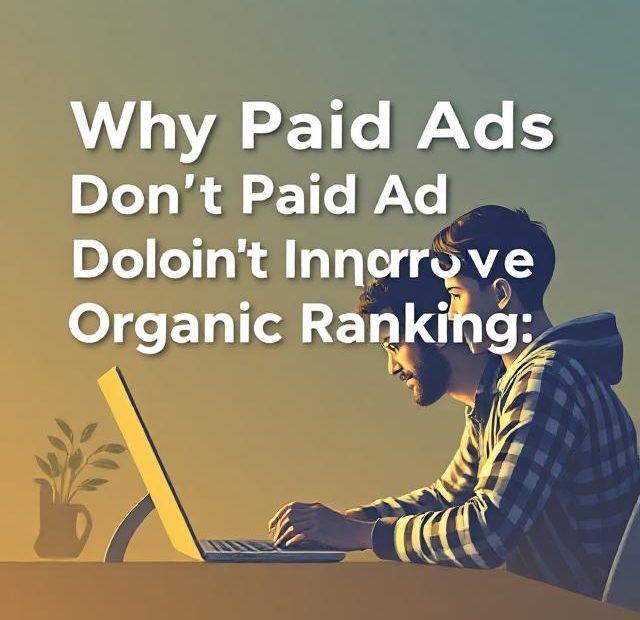There’s a common belief floating around in the digital marketing world: running paid ads on platforms like Google Ads or Facebook Ads will somehow boost your website’s organic rankings.
Let’s set the record straight—paid ads do not directly improve your organic search rankings.
This misconception often stems from observing increased traffic after launching ad campaigns. While paid ads can drive more visibility and even influence brand recognition, they have no direct effect on how Google ranks your site organically.
In this article, we’ll explore why this is the case, what Google officially says about it, and how you can smartly use paid ads to complement (but not replace) your SEO strategy.
Understanding the Difference: Paid vs. Organic
Before diving deeper, it’s important to understand the difference between paid search and organic search:
-
Paid Search involves buying ads to appear at the top of search engine results pages (SERPs). You pay each time someone clicks your ad (PPC).
-
Organic Search refers to the unpaid listings that appear based on Google’s ranking algorithm, which evaluates factors like content quality, backlinks, site speed, and user experience.
They appear on the same page, but they are driven by entirely separate systems within Google.
What Google Says About Paid Ads and Rankings
Google has been crystal clear about this for years. According to their own documentation and repeated statements:
“Running Google Ads does not help your SEO rankings.”
The algorithms that manage paid ads (Google Ads) and those that rank organic search results (Google Search) operate independently. Google’s search algorithm does not look at your ad spend, campaign performance, or ad impressions when determining your organic ranking.
They go as far as to say:
“Our search results are never influenced by payment to Google.”
So why does this myth persist?
Where the Confusion Comes From
1. Correlation vs. Causation
Sometimes, businesses see a spike in organic traffic after launching an ad campaign. This can lead to the assumption that the ads caused the organic ranking to increase.
In reality, this is more of a correlation than causation. Increased visibility from ads may lead to more brand searches or increased user engagement—but these are indirect benefits.
2. Brand Awareness Effects
When people repeatedly see your brand through paid ads, they may be more likely to click your organic result the next time they search. That improved click-through rate (CTR) might play a small role in ranking shifts, but again, the ad spend itself is not the trigger.
Why Google Keeps Ads and SEO Separate
There are several reasons why Google maintains this separation:
✅ Fairness
Google’s mission is to organize the world’s information and make it universally accessible and useful—not just to the highest bidder. Allowing paid influence over organic rankings would go against their commitment to search quality and user trust.
✅ Integrity of Search Results
If paid ads influenced organic rankings, search results would become unreliable. Users would no longer trust that they’re getting the most relevant results, and the value of SEO would be undermined.
✅ Regulatory Scrutiny
As a global tech giant, Google faces constant scrutiny from governments and regulators. Mixing paid advertising with search rankings would only invite more legal and ethical concerns.
How Paid Ads Can Indirectly Support SEO
Now that we’ve clarified that ads don’t directly improve rankings, let’s talk about how they can support your broader SEO efforts.
1. Faster Testing for Keywords and Content
Paid search campaigns allow you to quickly test which keywords and headlines perform best. The insights from ad click-through rates can help you shape your organic content strategy more effectively.
2. Increased Brand Searches
If users see your ad, remember your brand, and later search for it organically, this can increase your branded search volume—a signal that often correlates with stronger rankings.
3. Attracting Backlinks
Promoting blog posts or landing pages through ads can get your content in front of the right people, including journalists or influencers who may link to it. And as we know, backlinks are one of the most important ranking factors in SEO.
4. Boosting User Engagement
More traffic means more data. When people visit your site via paid ads and engage positively—spending time on the page, clicking through, and not bouncing quickly—it sends quality signals that can support your SEO in the long term.
When You Should Use Both SEO and Paid Ads
Paid ads and SEO are often most effective when used together—but for different purposes.
| Use SEO For | Use Paid Ads For |
|---|---|
| Long-term visibility | Immediate traffic |
| Building authority | Promoting offers |
| Cost-effective scaling | Keyword testing |
| Evergreen content | Seasonal campaigns |
In a well-balanced marketing strategy, both channels should support one another—not compete.
Final Thoughts
Let’s recap: running paid ads won’t move your site up the organic rankings. Google’s algorithms for search and advertising are entirely separate, and ad spend is not a ranking factor.
However, that doesn’t mean ads are useless in an SEO-driven strategy. Paid campaigns can generate exposure, accelerate testing, improve user signals, and build momentum for your content—all of which help SEO in the long run.
The best approach? Use both wisely. Let SEO build your foundation, and let paid ads amplify your reach. When aligned, these tools can grow your traffic, leads, and revenue—without any SEO myths getting in the way.
Also, you can learn more about Social Signals here.
